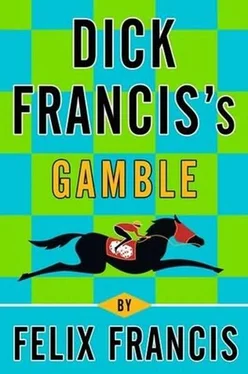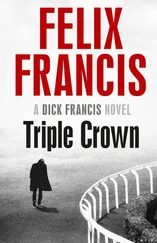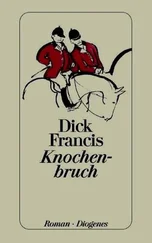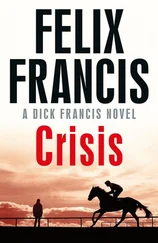Ichecked in to the hotel using a false name, and I paid for the room in advance with cash that I had drawn from an ATM in Euston Station. As the superintendent had said, I’d probably been watching too much TV. I didn’t really believe for a minute that the gunman had access to my credit card accounts, but I was taking absolutely no chances.
I had left the hospital by the main door only because there were no dark shadowy corners as there were outside the back entrance, but not before I had stood for a while behind a pillar watching the road, checking for anyone lurking in wait for me with a silenced pistol.
And I hadn’t left the building alone but had waited for a group of cleaning staff going off duty.
No one had fired a shot or come running after me. But would I even know if they did? I was certain Herb had been dead at Aintree before he realized what was happening.
I locked my bedroom door and then propped a chair under the door handle for good measure. I then relaxed a little and ate the takeaway cheeseburger, fries and milk shake that I’d bought from a late-night burger bar in the railway station.
It was the first thing I’d eaten all day. My mother would not have been pleased.
I removed my computer from my bag and logged on to the Internet to check my e-mails.
Amongst the usual bunch from various fund managers wanting me to contact them about their latest investment offering was one from Patrick expressing his disquiet over recent happenings both inside and outside the office.
It hadn’t been addressed solely to me but had been sent to all the Lyall & Black staff, but it felt like I was the main target.
“Dear colleagues,” Patrick had written. “At this time of seemingly major upheaval within the firm, it is important for us all to concentrate on why we are here. While we are, of course, greatly saddened by the tragic loss of Herb Kovak, it is our clients who we are here to serve. It is they who pay our salaries and we must not give them cause to look elsewhere for their investment advice. We need to conduct our personal affairs with the highest degree of probity and not give them any reason to doubt our honesty and integrity. I am sure that you will be asked by clients to speculate concerning the reason for Herb’s untimely death, as well as on the nature of it, and on the other unfortunate event that occurred in these offices last Thursday. I ask that you refrain from any comments that may in any way place Lyall & Black in a bad light. If in doubt, please refer the clients to Mr. Gregory or myself.”
I assumed that the “other unfortunate event” referred to was my arrest.
It made me wonder how Billy Searle was faring in the hospital and whether the police had made any progress in finding his attacker. Claudia’s cancer revelation and her operation, coupled with the minor matter of finding an assassin on my doorstep, had kept my mind somewhat occupied elsewhere.
I went on to the Racing Post website.
“Billy Searle,” it said, “was reported to be making steady progress. In fact, doctors at the Great Western Hospital in Swindon are amazed by the swiftness of his recovery from what were thought to be life-threatening injuries.”
They shouldn’t really be surprised, I thought. Jump jockeys were made tough and a breed apart from normal human beings. Broken bones and concussion were accepted as normal hazards of their employment, to be endured and recovered from as quickly as possible. All jockeys were self-employed-no rides meant no pay. It was a powerful incentive for quick healing.
There was nothing in the report about his attacker other than the stated hope that Searle would soon be able to be interviewed by the detectives investigating the incident about the identity of his assailant.
I wondered, meanwhile, if Billy was getting police protection.
The night passed without incident, although I lay awake for much of it half listening for someone climbing the drainpipe outside my bedroom window with gun in hand, and murder in mind.
I also spent the time thinking.
In particular, I spent the time thinking about the note I had found in Herb’s coat pocket. I knew the words of it by heart.
YOU SHOULD HAVE DONE WHAT YOU WERE
TOLD. YOU MAY SAY YOU REGRET IT, BUT
YOU WONT BE REGRETTING IT FOR LONG.
I had told DCI Tomlinson that I thought it hadn’t been so much a warning as an apology, even though he’d pooh-poohed the idea.
However, it did mean one thing for certain: Herb had known his killer, or at least he knew someone who knew he was going to die. That was assuming that the “won’t be regretting it for long” did, in fact, refer to him dying soon. It could, I suppose, have been from a girlfriend who was dumping him for not doing as he was told, but somehow I doubted it. Notes from girlfriends are never written in stark capital letters without a salutation of some kind, and a name.
What had Herb been told to do that he hadn’t done?
Was it something to do with the gambling and the credit cards, or was there something else?
I turned on the bedside light and wrote out the words in full on a notepad:
YOU SHOULD HAVE DONE WHAT YOU WERE
TOLD. YOU MAY SAY YOU REGRET IT, BUT
YOU WONT BE REGRETTING IT FOR LONG.
I studied it carefully.
Maybe Herb hadn’t “not done” something that he’d been told to do, perhaps he had “done” something that he’d been told not to.
But to whom had he expressed regret for his inaction or action? And why had he regretted it? Because it had been wrong or because it had placed him in danger?
Still so many questions and still so few answers.
“Leave the investigating to the professionals,” the chief inspector had said to me. But how long would they take? And would I still be alive by then?
Maybe it was time for me to start poking a few hornets’ nests, and hope not to get stung.
Iwent into the hospital just after seven-thirty on Wednesday morning. Claudia was so much improved, sitting up in her uncomfortable bed without as much as a murmur about backache, and she was eating a breakfast of muesli and natural yogurt.
“Well, look at you,” I said, smiling broadly. “You obviously had a better night than me.”
“Why? What was wrong with your night?” she asked.
“Lumpy hotel bed,” I said.
“Why didn’t you go home?”
Ah, I thought, careless. Now what do I say?
“I wanted to be nearer you, my darling.”
“But what a waste of money,” she said with mock disapproval of my profligacy. “If I have to stay in here another night, I insist you go home. I’ll be fine.”
Little did she know that there was no way I was going home and neither was she. It was far too risky.
“You look well enough to run a marathon,” I said. “I’m sure they’ll chuck you out just as soon as Dr. Tomic’s seen you.”
“The nurse says he’s usually here by eight.”
I looked up at the clock on the wall, the one that had driven me mad the previous day when Claudia had been in the operating room.
It was ten minutes before eight.
As if on cue, Dr. Tomic swept into the room. He had the blue scrubs on but this time wore a doctor’s white coat over them.
“Good morning, Claudia,” he said, and he nodded at me. “How are you feeling?”
“Much better than last night,” Claudia replied. “But I’m rather sore.”
“Yes,” he said. “That’s normal. I had to make incisions in the abdominal wall. They were only small but still painful. Do you think you are well enough to get up?”
“I have been,” she said, almost in triumph. “I went to the loo last night and again this morning.”
“Good,” he said. “Then I think you can go home today. I’ll see you in ten days to check on everything and take out the stitches. Until then, take it easy.”
Читать дальше












